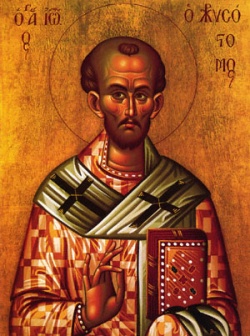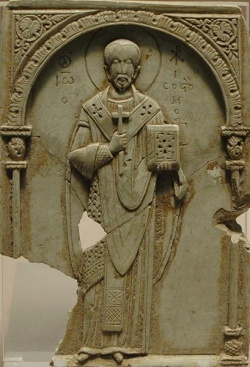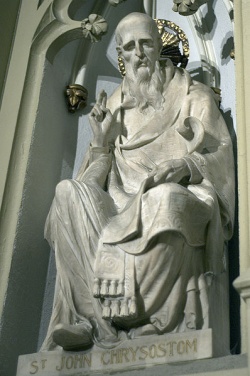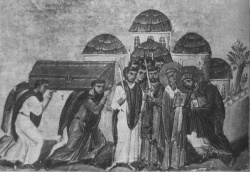John Chrysostom
From Textus Receptus
(→Biography) |
|||
| Line 37: | Line 37: | ||
'''Death and Canonization''' | '''Death and Canonization''' | ||
| - | [[ | + | |
| + | [[Image:4 800px-Apostoles Constantinople.JPG|250px|thumb|left|The return of the relics of St. John Chrysostom to the Church of the Holy Apostles in Constantinople.]] | ||
| + | |||
Pope Innocent I protested at this banishment, but to no avail. Innocent sent a delegation to intercede on behalf of John in 405. It was led by Gaudentius of Brescia; Gaudentius and his companions, two bishops, encountered many difficulties and never reached their goal of entering Constantinople.<sup>[23]</sup> | Pope Innocent I protested at this banishment, but to no avail. Innocent sent a delegation to intercede on behalf of John in 405. It was led by Gaudentius of Brescia; Gaudentius and his companions, two bishops, encountered many difficulties and never reached their goal of entering Constantinople.<sup>[23]</sup> | ||
Revision as of 07:54, 28 January 2010
John Chrysostom (c. 347–407, Greek: Ἰωάννης ὁ Χρυσόστομος), Archbishop of Constantinople, was an important Early Church Father. He is known for his eloquence in preaching and public speaking, his denunciation of abuse of authority by both ecclesiastical and political leaders, the Divine Liturgy of St. John Chrysostom, and his ascetic sensibilities. After his death (or, according to some sources, during his life) he was given the Greek surname chrysostomos, meaning "golden mouthed", rendered in English as Chrysostom.[1][2]
The Orthodox and Eastern Catholic Churches honor him as a saint and count him among the Three Holy Hierarchs, together with Saints Basil the Great and Gregory Nazianzus. He is recognized by the Eastern Orthodox Church and Roman Catholic Church as a saint and Doctor of the Church. Churches of the Western tradition, including the Roman Catholic Church, some Anglican provinces, and parts of the Lutheran Church, commemorate him on 13 September. Some Lutheran and many Anglican provinces commemorate him on the traditional Eastern feast day of 27 January. The Coptic Orthodox Church of Alexandria recognizes John Chrysostom as a saint (feast days: 16 Thout and 17 Hathor).[3]
John is known in Christianity chiefly as a preacher, theologian and liturgist, particularly in the Eastern Orthodox Church. Among his sermons, eight directed against Judaizing Christians remain controversial for their impact on the development of Christian antisemitism.[4][5][6]. He was also active in destruction of pagan symbols and places of worship, including the temple of Artemis at Ephesus.
Biography
Early life and education
John was born in Antioch in 349.[7] Different scholars describe his mother Anthusa as a pagan[8] or as a Christian, and his father was a high ranking military officer.[9] John's father died soon after his birth and he was raised by his mother. He was baptised in 368 or 373 and tonsured as a reader (one of the minor orders of the Church).[10] As a result of his mother's influential connections in the city, John began his education under the pagan teacher Libanius. From Libanius John acquired the skills for a career in rhetoric, as well as a love of the Greek language and literature.[11] As he grew older, however, he became more deeply committed to Christianity and went on to study theology under Diodore of Tarsus, founder of the re-constituted School of Antioch. According to the Christian historian Sozomen, Libanius was supposed to have said on his deathbed that John would have been his successor "if the Christians had not taken him from us".[12] He lived with extreme asceticism and became a hermit in about 375; he spent the next two years continually standing, scarcely sleeping, and committing the Bible to memory. As a consequence of these practices, his stomach and kidneys were permanently damaged and poor health forced him to return to Antioch.[13]
Priesthood and service in Antioch
He was ordained as a deacon in 381 by Saint Meletius of Antioch, and was ordained as a presbyter (that is, a priest) in 386 by Bishop Flavian I of Antioch. Over the course of twelve years, he gained popularity because of the eloquence of his public speaking, especially his insightful expositions of Bible passages and moral teaching. The most valuable of his works from this period are his Homilies on various books of the Bible. He emphasised charitable giving and was concerned with the spiritual and temporal needs of the poor. He also spoke out against abuse of wealth and personal property:
- Do you wish to honour the body of Christ? Do not ignore him when he is naked. Do not pay him homage in the temple clad in silk, only then to neglect him outside where he is cold and ill-clad. He who said: "This is my body" is the same who said: "You saw me hungry and you gave me no food", and "Whatever you did to the least of my brothers you did also to me"... What good is it if the Eucharistic table is overloaded with golden chalices when your brother is dying of hunger? Start by satisfying his hunger and then with what is left you may adorn the altar as well.[14]
His straightforward understanding of the Scriptures – in contrast to the Alexandrian tendency towards allegorical interpretation – meant that the themes of his talks were practical, explaining the Bible's application to everyday life. Such straightforward preaching helped Chrysostom to garner popular support. He founded a series of hospitals in Constantinople to care for the poor.[15]
One incident that happened during his service in Antioch illustrates the influence of his sermons. When Chrysostom arrived in Antioch, the bishop of the city had to intervene with Emperor Theodosius I on behalf of citizens who had gone on a rampage mutilating statues of the Emperor and his family. During the weeks of Lent in 397, John preached twenty-one sermons in which he entreated the people to see the error of their ways. These made a lasting impression on the general population of the city: many pagans converted to Christianity as a result of the sermons. As a result, Theodosius' vengeance was not as severe as it might have been.[16]
Archbishop of Constantinople
In 398, John was requested, against his will, to take the position of Archbishop of Constantinople. He deplored the fact that Imperial court protocol would now assign to him access to privileges greater than the highest state officials. During his time as Archbishop he adamantly refused to host lavish social gatherings, which made him popular with the common people, but unpopular with wealthy citizens and the clergy. His reforms of the clergy were also unpopular with these groups. He told visiting regional preachers to return to the churches they were meant to be serving—without any payout.[17] In 401, Chrysostom led a mob to finally destroy the Temple of Artemis at Ephesus[18] (one of the Seven Wonders of the Ancient World, although it had been destroyed and rebuilt several times by then).
His time in Constantinople was more tumultuous than his time in Antioch. Theophilus, the Patriarch of Alexandria, wanted to bring Constantinople under his sway and opposed John's appointment to Constantinople. Being an opponent of Origen's teachings, he accused John of being too partial to the teachings of that theologian. Theophilus had disciplined four Egyptian monks (known as "the tall brothers") over their support of Origen's teachings. They fled to and were welcomed by John. He made another enemy in Aelia Eudoxia, the wife of the eastern Emperor Arcadius, who assumed (perhaps with justification) that his denunciations of extravagance in feminine dress were aimed at herself.[16]
Depending on one's outlook, John was either tactless or fearless when denouncing offences in high places. An alliance was soon formed against him by Eudoxia, Theophilus and others of his enemies. They held a synod in 403 (the Synod of the Oak) to charge John, in which his connection to Origen was used against him. It resulted in his deposition and banishment. He was called back by Arcadius almost immediately, as the people became "tumultuous" over his departure.[19] There was also an earthquake the night of his arrest, which Eudoxia took for a sign of God's anger, prompting her to ask Arcadius for John's reinstatement.[20] Peace was short-lived. A silver statue of Eudoxia was erected in the Augustaion, near his cathedral. John denounced the dedication ceremonies. He spoke against her in harsh terms: "Again Herodias raves; again she is troubled; she dances again; and again desires to receive John's head in a charger,"[21] an allusion to the events surrounding the death of John the Baptist. Once again he was banished, this time to the Caucasus in Armenia.[22]
Death and Canonization
Pope Innocent I protested at this banishment, but to no avail. Innocent sent a delegation to intercede on behalf of John in 405. It was led by Gaudentius of Brescia; Gaudentius and his companions, two bishops, encountered many difficulties and never reached their goal of entering Constantinople.[23]
John wrote letters which still held great influence in Constantinople. As a result of this, he was further exiled to Pitiunt (Georgia) where his tomb is a shrine for pilgrims. He never reached this destination, as he died during the journey. His last words are said to have been, "δόξα τῷ θεῷ πάντων ἕνεκεν" (Glory be to God for all things).[20]
John came to be venerated as a saint soon after his death. His disciple, Saint Proclus, Patriarch of Constantinople (434-447), during services in the Church of Hagia Sophia, preached a sermon praising his teacher. He said, "O John, your life was filled with sorrow, but your death was glorious. Your grave is blessed and reward is great, by the grace and mercy of our Lord Jesus Christ O graced one, having conquered the bounds of time and place! Love has conquered space, unforgetting memory has annihilated the limits, and place does not hinder the miracles of the saint." This sermon helped to mobilize public opinion, and the patriarch received permission from the emperor to return Chrysostom's relics to Constantinople, where they were enshrined in the Church of the Holy Apostles.
The Eastern Orthodox Church commemorates him as a "Great Ecumenical Teacher", together with Basil the Great and Gregory the Theologian. These three saints, in addition to having their own individual commemorations throughout the year, are commemorated together on 30 January, a feast known as the Synaxis of the Three Hierarchs.
There are several feast days dedicated to him:
- 27 January, Translation of the relics of St John Chrysostom from Comana to Constantinople
- 30 January, Synaxis of the Three Great Hierarchs
- 14 September, Repose of St John Chrysostom
- 13 November, St John Chrysostom the Archbishop of Constantinople
For more articles, see External Link below.
Notes
- 1. "St John Chrysostom" in the Catholic Encyclopedia, available online; retrieved March 20, 2007.
- 2. Pope Vigilius, Constitution of Pope Vigilius, 553
- 3. Coptic synaxarium
- 4. John Chrysostom, Discourses against Judaizing Christians, translated by Paul W. Harkins. The Fathers of the Church; v. 68 (Washington: *Catholic University of America Press, 1979)
- 5. Walter Laqueur, The Changing Face of Antisemitism: From Ancient Times To The Present Day, (Oxford University Press: 2006), p. 48. ISBN 0-19-530429-2. 48
- 6. Yohanan (Hans) Lewy, "John Chrysostom" in Encyclopedia Judaica (CD-ROM Edition Version 1.0), Ed. Cecil Roth (Keter Publishing House: 1997). ISBN 965-07-0665-8.
- 7. The date of John's birth is disputed. For a discussion see Robert Carter, "The Chronology of St. John Chrysostom's Early Life", in Traditio 18:357–64 (1962) Jean Dumortier, "La valeur historique du dialogue de Palladius et la chronologie de saint Jean Chrysostome", in Mélanges de science religieuse, 8:51–56 (1951). Carter dates his birth to the year 349. See also Robert Louis Wilken, John Chrysostom and the Jews: Rhetoric and Reality in the Late Fourth Century, (Berkeley: University of California Press:1983), p.5.
- 8. "John Chrysostom", Encyclopedia Judaica
- 9. The Encyclopedia Judaica describes Chrysostom's mother as a pagan. In Pauline Allen and Wendy Mayer, John Chrysostom, (Routledge:2000), p.5 ISBN 0-415-18252-2, she is described as a Christian.
- 10. Wilken (p. 7) prefers 368 for the date of Chrysostom's baptism, the Encyclopedia Judaica prefers the later date of 373.
- 11. Wilken, p. 5.
- 12. Sozomen (1995) [1890]. "Ecclesiastical History of Sozomen, Book VIII, Chapter II: Education, Training, Conduct, and Wisdom of the Great John Chrysostom". in Schaff, Philip and Wace, Henry (trs., eds.). Nicene and Post-Nicene Fathers, Volume II: Socrates and Sozomenus Ecclesiastical Histories. Zenos, A. C. (rev., notes) (reprint ed.). Peabody: Hendrickson Publishers. pp. 399. ISBN 1-56563-118-8. http://www.ccel.org/ccel/schaff/npnf202.iii.xiii.ii.html. Retrieved 2007-03-29.
- 13. Pauline Allen and Wendy Mayer, John Chrysostom, (Routledge:2000), p.6 ISBN 0-415-18252-2,
- 14. John Chrysostom, In Evangelium S. Matthaei, hom. 50:3-4: PG 58, 508-509
- 15. See Cajetan Baluffi, The Charity of the Church, trans. Denis Gargan (Dublin: M H Gill and Son, 1885), p. 39 and Alvin J. Schmidt, Under the Influence: How Christianity Transformed Civilization (Grand Rapids, Mich.: Zondervan, 2001), p. 152
- 16. Robert Wilken, "John Chrysostom" in Encyclopedia of Early Christianity, ed. Everett Ferguson (New York:Garland Publishing, 1997).
- 17. David H. Farmer, The Oxford Dictionary of the Saints, second ed. (New York:Oxford University Press, 1987) p.232.
- 18. John Freely, The Western Shores of Turkey: Discovering the Aegean and Mediterranean Coasts 2004, p. 148
- 19. Socrates Scholasticus (1995) [1890]. "Book VI, Chapter XVI: Sedition on Account of John Chrysostom's Banishment". in Schaff, Philip and Wace, Henry (trs., eds.). Nicene and Post-Nicene Fathers, Volume II: Socrates and Sozomenus Ecclesiastical Histories. Zenos, A. C. (rev., notes) (reprint ed.). Peabody: Hendrickson Publishers. pp. 149. ISBN 1-56563-118-8. http://www.ccel.org/ccel/schaff/npnf202.ii.ix.xvii.html. Retrieved 2007-03-29.
- 20. "St John Chrysostom the Archbishop of Constantinople". Orthodox Church in America. http://ocafs.oca.org/FeastSaintsLife.asp?FSID=103292. Retrieved 2007-03-29.




